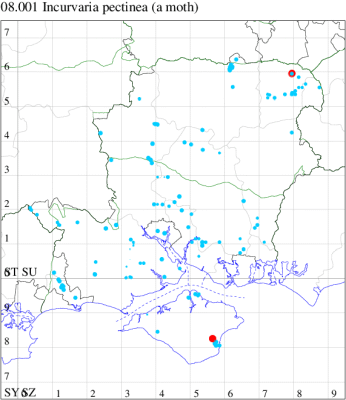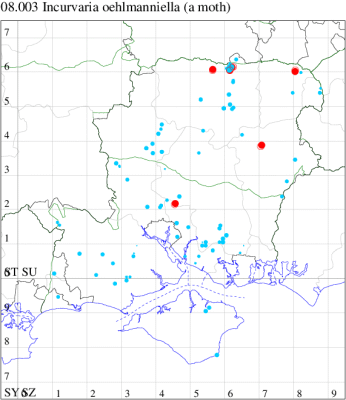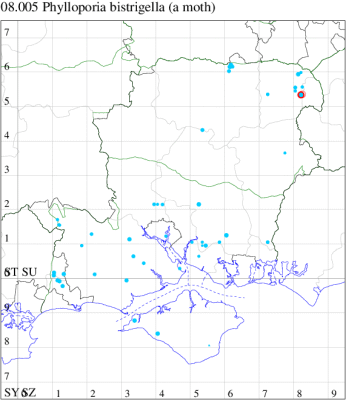2020 Annual Report for: Incurvariidae / Incurvariinae
For species seen in 2020 that had less than or equal to 100 records, full details are included; for more common species, the earliest, latest and highest count by vice-county are shown. The narrative for each species is taken from the main Hantsmoths website, and it is possible that some information on abundance and occurrence can get out of date, as it is impossible to keep up with all changes; however it should give a good introduction to each species. The tables in each species account summarise the previous status, and that for the current year.
For the maps, all records prior to 2020 are shown by a blue dot (the larger the dot, the more recent), with the current year's records shown in red. As previous records are superimposed on any report for 2020, new sites have greater emphasis (i.e. will show as 'more red').
In the species accounts, an asterisk next to a location indicates a new 10km square record; earliest ever dates are highlighted in orange, and latest ever in red. Initials in the species accounts refer to the recorders listed here. Please get in touch if you identify any omissions or errors, in particular if you have records that have yet to be submitted. Details of how to submit records can be found here.
08.001 [B&F: 0129] Incurvaria pectinea Haworth, 1828 - Local
Local in woodland and heathland throughout the British Isles, more numerous in the north. In Hampshire fairly well-distributed, but less common on the Isle of Wight. Wingspan 12-16 mm. The main confusion species are I. masculella and I. oehlmanniella, but I. pectinea is less distinctly marked. Larva mines leaves of Silver and Downy Birch, and Hazel, living within a movable case, subsequently feeding in fallen leaves, and over-wintering as a pupa.
Records prior to 2020
| Vice County | #Records | #Individuals | First Record | Last Record |
|---|---|---|---|---|
| 10 | 13 | 56 | 1985 | 2019 |
| 11 | 89 | 95 | 1972 | 2019 |
| 12 | 56 | 45 | 1976 | 2017 |
2020 records
| Vice County | #Records | #Individuals | Max Quantity |
|---|---|---|---|
| 10 | 1 | 27 | 27 |

Records by year
Records by week (adult)
Records by week (larval)
Record Details
VC10: America Wood, larva, 27, field observation, single Hazel leaf with 27 occupied mines, 11 May (IOu);
VC12: Castle Bottom NNR, larva, present, field observation, 01 May (JHH)
08.002 [B&F: 0130] Incurvaria masculella ([Denis & Schiffermüller], 1775) - Common
Common on woodland edges, hedgerows, scrubland and gardens throughout the British Isles. Widespread and common in both Hampshire and on the Isle of Wight. Wingspan 12-16 mm. Female could be confused with I. oehlmanniella but yellow marking on costa (if present) is closer to head than adjacent tornal spot, also has relatively narrow scales on the hindwing (MBGBI Vol 1). Larva mines leaves of Hawthorn, living within a movable case, subsequently feeding in the fallen leaves.
Records prior to 2020
| Vice County | #Records | #Individuals | First Record | Last Record |
|---|---|---|---|---|
| 10 | 56 | 69 | 1900 | 2018 |
| 11 | 260 | 295 | 1971 | 2019 |
| 12 | 93 | 128 | 1974 | 2019 |
2020 records
| Vice County | #Records | #Individuals | Max Quantity |
|---|---|---|---|
| 10 | 7 | 7 | 1 |
| 11 | 2 | 2 | 1 |
| 12 | 3 | 4 | 2 |

Records by year
Records by week (adult)
Records by week (larval)
Record Details
VC10: Carisbrooke, one, field observation, 23 Apr (JGoo); Bonchurch, one, 19 Apr (JHa); Lower Hyde, one, 16 Apr; Shanklin, one, 21 Apr; one, 02 May; one, 21 May; Westridge, one, field observation, 23 Apr (IOu);
VC11: Eastleigh, one, to actinic, 26 May (KArb); Crab Wood, Winchester, one, 16 May (DAS); Fareham, one, ♀, 16 Apr (ADT);
VC12: Pamber Forest, one, 28 May; Lower Inhams Copse, Pamber, two, field observation, 14 May; Pamber Forest, one, ♀, 12 Apr (GJD); Yateley*, one, field observation, 26 Apr (JHH)
08.003 [B&F: 0131] Incurvaria oehlmanniella (Hübner, 1796) - Common
Common on heathland and moorland throughout much of the British Isles, on the Welsh and Scottish hills may be found up to 1000 m. In Hampshire fairly widespread, in damp woodland, where usually seen by day or at light, with only one record of a larval case being found in the county. First recorded from the Isle of Wight in 2014. Wingspan 12-15 mm. Imago most likely to be confused with I. masculella, which see. Larva mines leaves of Bilberry, living within a movable case, subsequently feeding in the fallen leaves.
Records prior to 2020
| Vice County | #Records | #Individuals | First Record | Last Record |
|---|---|---|---|---|
| 10 | 4 | 4 | 2014 | 2018 |
| 11 | 93 | 103 | 1976 | 2019 |
| 12 | 65 | 126 | 1991 | 2019 |
2020 records
| Vice County | #Records | #Individuals | Max Quantity |
|---|---|---|---|
| 11 | 2 | 2 | 1 |
| 12 | 9 | 13 | 4 |

Records by year
Records by week (adult)
Records by week (larval)
Record Details
VC11: Allbrook, one, 26 May (SI);
VC12: Axmansford*, one, 02 Jun (ACB det. GJD); Pamber Forest, one, to actinic, 27 May; one, 28 May; four, 30 May; one, 14 Jun; one, 20 May; two, 25 May; one, 04 Jun (GJD); Alton*, one, 18 May (BCA); Yateley*, three, 21 May; one, 26 May (JHH)
08.005 [B&F: 0128] Phylloporia bistrigella (Haworth, 1828) - Local
Local in scrub and heathland throughout much of Britain and Ireland. In Hampshire there are scattered records in the south and north-east of the county, notably at Botley Wood and at Fleet, but generally uncommon in the north of the county and on the Isle of Wight, although perhaps under-recorded since the extent of known records correlate with those areas in which the recording effort is concentrated. Wingspan 7-9 mm. Imago can be separated from other similar Incurvariidae by its small size, but often recorded in the larval stage, the mines of which are distinctive. Larva mines leaves of Birch, living within a movable case, subsequently feeding in the fallen leaves. The mines are described in the following link:
leafmines.co.uk
.
Records prior to 2020
| Vice County | #Records | #Individuals | First Record | Last Record |
|---|---|---|---|---|
| 10 | 5 | 4 | 1977 | 2017 |
| 11 | 56 | 55 | 1975 | 2018 |
| 12 | 18 | 16 | 1976 | 2019 |
2020 records
| Vice County | #Records | #Individuals | Max Quantity |
|---|---|---|---|
| 12 | 1 | 1 | 1 |

Records by year
Records by week (adult)
Records by week (larval)
Record Details
VC12: Fleet, one, field observation, 30 May (MHals)